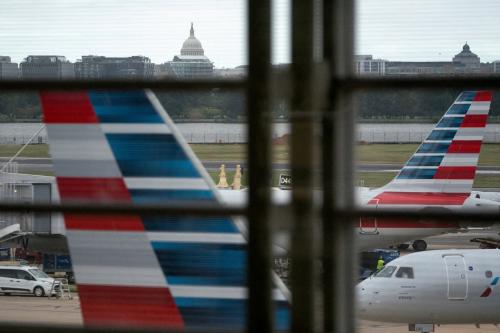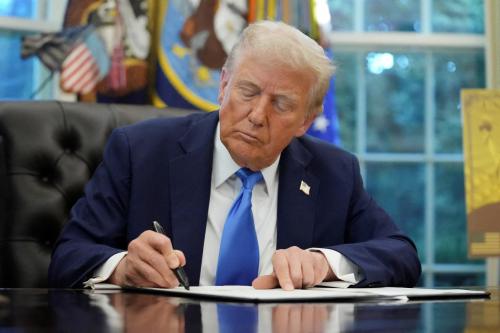After a six-week partisan standoff in the Senate, enough Democrats to overcome the filibuster assented to reopening the federal government. They did so without winning their key bargaining demand of extending Obamacare subsidies, which had ostensibly fueled their refusal to fund this government in the first place.
The decision has observers scratching their heads and activists shaking their fists. In exchange for all the flight delays, worker furloughs, SNAP disruptions, and broader economic damage brought on by the longest government shutdown in U.S. history, the Democrats seem to have extracted little more than promises of a vote on extending ACA subsidies (and only in the Senate, of course), some additional job security for federal workers, and some additional funding security for nutrition programs.
The politics seem especially puzzling. According to most polls, it was Republicans who had been shouldering a disproportionate share of the shutdown blame, and the Democrats had just notched a handful of decisive electoral victories. Momentum was on their side. But the confetti had barely hit the floor when their chorus of “We Are the Champions” morphed into “Another One Bites the Dust.”
Why did the Democrats cave? Why do they always seem to cave?
“Dealmakers,” my new book with Andrew Ballard and Christopher Jan Carman, yields a somewhat different take than the one that rapidly coalesced on social media. Our data imply that the Democrats were always more likely to give ground first, but not due to a lack of fortitude. They may have capitulated, or they may have just compromised—which, according to James Madison, is what democratic lawmaking is supposed to be all about.
That is, in recognizing their limited leverage as the minority party (off-year electoral wins notwithstanding) and by understanding the psychology of their Republican adversaries, the Democrats might have just struck as good a deal as they could have realistically hoped to achieve under the circumstances. Securing a vote on the Obamacare subsidies and some job security for a few federal workers is far from a triumph, but it may be more than the Democrats were going to get otherwise.
As Senator Shaheen (D-N.H.) summarized, “Republicans control the White House, the Senate, and the House, and they made clear over a period of weeks … that this was as far as they would go … This was the only deal on the table.”
Another factor is that as the shutdown’s effects intensified, many Democratic lawmakers placed greater weight on alleviating the hardship than on maintaining their negotiating position—a dynamic that played out differently among Republican lawmakers. Holding out for a few more weeks was unlikely to push the GOP to extend Obamacare subsidies, but it would have pushed a lot of travelers out of the sky and a lot of kids away from the dinner table.
Senator Hassan (D-N.H.) put it this way: “My vote today was … so that our kids eat, so that our elderly citizens eat, so that our air traffic controllers can get some sleep … and so that our veterans are protected.” Senator Durbin (D-Ill.), the Democratic Whip, added that he couldn’t “accept a strategy which wages political battle at the expense of my neighbor’s paycheck or the food for his children.”
Empathy and compromise
Stepping back, if politics is truly the “art of the possible,” Capitol Hill is hardly a showcase for it. As readers of this blog may know, “compromise” remains a loaded term for many members of Congress. Still, some lawmakers in Washington continue to work across the aisle rather than simply hold their ground. And more often than not, those dealmakers have had Ds next to their names.
Why? The way some people see it, compromise (whether Democratic or not) is little more than weakness: it’s not really knowing what one wants, not caring enough to fight for what one wants, and/or not having the leverage to demand what one wants. But according to our analyses, compromise is actually less about apathy than it is about empathy, and obstinacy is less about conviction than it is about competitiveness.
To elaborate, we find in our research that empathy—specifically, the instinctive tendency to take the perspectives of people who are different from oneself—encourages support for political compromise. It does so, our data suggest, by enhancing the perceived value of deliberation in its own right (rather than just a means to a material end), softening inter-partisan animus, and weakening the penchant for loss aversion (the tendency to cling when things feel like they’re slipping away).
Even more critically, empathy undergirds egalitarian and humanitarian values, which comprise the essence of ideological liberalism and therefore Democratic partisanship. Those values motivate a lot of domestic policymaking, to which gridlock is anathema. In other words, to many “bleeding heart liberals,” compromise is a necessary tool for achieving social progress. Moreover, whereas moral and ideological conviction in the service of conservative perspectives can provoke negotiating intransigence, egalitarian fervency strengthens support for compromise even further.
Tendencies, not absolutes
To be clear, we’re not suggesting that those partisan differences in personality and values are nice and neat. Undeniably, many Republicans celebrate the common good (especially through institutions such as the church and the military), and many Democrats pursue a combative form of identitarian “cancel culture” that is anything but empathetic. In short, plenty of progressives are pugilistic, and a corps of conservatives are compassionate. But in our data, the partisan value tendencies we’ve been describing are substantial. As long as they persist, Democratic support for compromise will outpace that of Republicans.
The role of voters
The simplest reason that Democratic lawmakers are more willing to bargain is that Democratic voters are more likely to demand it. For decades now, poll after poll has shown that Democrats are more supportive of compromise than Republicans are—not just in the abstract, but when it comes to what they want their own representatives to do.
The data in our book, which combines nationally representative voter surveys with years of lawmaker tweets, their floor votes, and their legislative bill texts, pegs the typical difference in such support at around 15 percentage-points—a gap that vanishes entirely when Republicans express Democratic-level tendencies to “imagine how I would feel if I were in the place” of others, but that jumps to over 40% when Republicans reject that statement.
A close look at recent shutdown-related surveys reveals a similar pattern, which offers insight into the Democrats’ supposed capitulation. Yes, most of those polls indicated that more voters blamed the Republicans for the shutdown than Democrats—a difference that was shrinking by the week, it’s worth pointing out—but a Halloween poll by YouGov/CBS exposed that Democratic respondents in particular, in comparison to Republican respondents, were much less likely to approve of their own side’s obstinacy. It’s reasonable to suspect that swing-state Democratic voters (whom most of the eight “capitulators” represent) were even more inclined to do so than were solid-blue state voters.
And as for those election victories on Nov. 4, it’s notable that the biggest winner—Abigail Spanberger, who captured a larger share of the vote in Virginia than any other Democratic gubernatorial candidate had since before Jim Crow was abolished—was fervently opposed to keeping the government closed. When asked if her victory should be used as leverage to demand greater concessions from Republican Senators before reopening the government, she responded, “Absolutely not … Virginians need to and Virginians want to see the government reopen, and my expectation is that we will see a Congress, a Senate, and ultimately a president driving us in that direction.”
In summary, Democrats were always unlikely to outlast Republicans in the government shutdown. Republicans often emphasize limiting federal authority and are therefore less inclined to expedite government operations when disputes arise. They also approach social welfare programs differently than Democrats, which influences how each party reacts when benefits are interrupted. Thus, if viewed purely through the lens of a few political news cycles, it’s easy to view the shutdown as a foolish Democratic gambit.
However, if the Democrats’ real goal was to strengthen their negotiating hand (if even only a little bit) while signaling to swing voters that they’re ultimately more interested in their constituents’ well-being than they are in scoring political points, they may have made some headway. Even on the subject of scoring political points, the shutdown may eventually help Democrats. By amplifying the issue of rising Obamacare premiums—and especially by forcing Republicans to publicly defend them on the floor in the coming months—the shutdown may ultimately serve to dramatize the issue in a way that no number of floor speeches or other strategies could have.
The Brookings Institution is committed to quality, independence, and impact.
We are supported by a diverse array of funders. In line with our values and policies, each Brookings publication represents the sole views of its author(s).








Commentary
Did Democrats cave or compromise in ending the shutdown?
November 20, 2025